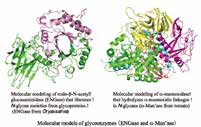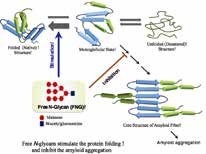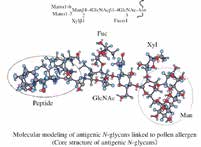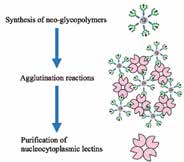Research Area : Chemistry of Bioactive Compounds
Functional analysis of oligosaccharides involved in plant differentiation, growth, and fruit maturation

In developing hypocotyls, seeds, and fruits at the maturing stage, free N-glycans (FNG) released from glycoproteins or glycopeptides occur at micro molar concentration. We analyze (1) the biofunctions of FNs involved in plant differentiation, growth, and fruit maturation, (2) chaperon-like functions involved in the protein-folding or -refolding mechanism. Based on the unraveled of the biofunctions of FNGs, we aim to establish a new plant biotechnology to control plant differentiation, growth, and fruit-maturation through artificial regulation of the expression of glycogenes (glycosidases, glycosyltrasferases, and glycan-liberating enzymes).
Analysis of in vivo / in vitro functions of free N-glycans (FNGs) responsible for correct protein folding and refolding

In plant and animal cells or tissues, the liberated asparagine-linked glycans (free N-glycans, FNG) ubiquitously occur. Recently we have found that these FNGs induce the correct protein folding or refolding of denatured or misfolded proteins at millimolar concentration. We analyze the chaperon-like activity of FNGs involved in the protein quality control system working in eukaryotic cells using biochemical and physiochemical strategies. We aim to establish a new concept of glycan function responsible for correct protein folding and apply the chaperon-like function to the development of glycol-reagents stimulating the correct construction of protein 3D structures.
Research Area : Functional Glycobiochemistry
Analysis of the immunological activities of antigenic glycans of plant or insect origin

In many case, allergens of plant or insect origin are glycoproteins to which antigenic glycans are linked and these allergens are often referred as glycoallergens. We analyze the chemical structures and immunological activities of these plant glycoallergens. Recently, we have found that plant antigenic glycans suppress the production of Th2 type cytokine, IL4, from Th2 immune cells. For the application of immunological activity of these plant glycans to the development of glycodrugs, we analyze their cellular immunological activities and synthesize neo-glycopolymers carrying the immunoactive glycans.
Application of a neo-glycopolymer carrying multivalent N-glycopeptides for identification of nucleocytoplasmic lectins

Recently, several novel plant lectins localized in the nucleus and/or cytoplasm of plant cells have been reported, and some of them have induced the gene expression under biotic and/or abiotic stress condition. The endogenous ligands and the physiological role of these carbohydrate-binding proteins have not been identified to date. We have synthesized glycopolymers carrying multivalent N-glycopeptides to identify and characterize the nucleocytoplasmic lectins.



